Foreign
Israeli Troops Pull Out Of Al Shifa Hospital, Gaza
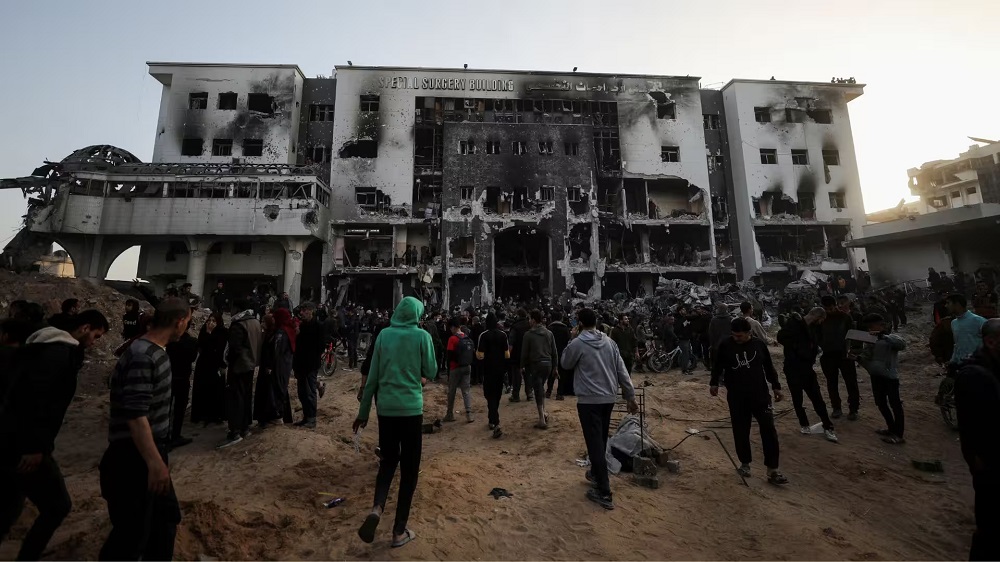
Israeli troops have pulled out of al-Shifa hospital in Gaza City, according to witnesses who spoke to the BBC.
The medical facility was first raided two weeks ago after the Israel Defense Forces (IDF) said it had intelligence indicating Hamas was using it as a base to launch attacks.
Heavy fighting has been reported around the hospital, the largest in Gaza, in recent weeks.
Hamas denies using medical sites to carry out military operations.
Following the withdrawal on Monday, Palestinian media reports said dozens of bodies were found in the vicinity of the complex, citing witnesses and the Hamas-run health ministry.
The BBC has not verified those reports. But the World Health Organization (WHO) has said 21 patients have died in al-Shifa in the past two weeks, while Israel’s Prime Minister Benjamin Netanyahu said more than 200 “terrorists” were killed.
When the raid was first announced, IDF chief spokesman Daniel Hagari said “Hamas terrorists have regrouped inside al-Shifa hospital”.
The IDF said then it was launching a “high-precision” operation on the grounds of the hospital and urged displaced civilians sheltering on its grounds to leave immediately.
Witnesses reported heavy gunfire and tanks surrounding the facility when the raid began in early hours of the morning on 18 March.
Al-Shifa was raided earlier in the conflict after Israel said it had evidence that hostages captured during the 7 October attack were taken there.
Israel has long accused Hamas of using civilian health infrastructure as a cover to launch its operations, which the Palestinian group refutes.
Dr Tedros Adhanom Ghebreyesus, head of the WHO, has described the situation at al-Shifa hospital as a “siege”.
In a post on X – formerly Twitter – made prior to the troops withdrawal, he said more than 100 people were still inside al-Shifa struggling with a lack of food water, and medical supplies.
But Mr Netanyahu has reiterated that al-Shifa was a “terrorist lair” and praised the efforts of Israeli soldiers for conducting a “precise and surgical” surprise attack.
The Israeli PM made his remarks on Sunday night prior to entering surgery to treat a hernia discovered during a routine check-up.
Early on Monday his office said the operation was successful and Mr Netanyahu was “in good shape and beginning to recover”.
The surgery took place amid demonstrations held in Jerusalem fuelled by mounting anger over his government’s handling of the war in Gaza. Thousands took to the streets demanding more action to free hostages.
Around 130 people – at least 34 of whom are presumed dead – are still unaccounted for after Hamas’s 7 October attack on Israel.
Mr Netanyahu is under pressure from some in Israeli society who believe there has been insufficient progress in rescuing the remaining hostages inside Gaza. His office had said Mr Netanyahu and his wife were meeting with the families of female soldiers still unaccounted for.
Also on Sunday, seven journalists – including a freelancer working for the BBC – were injured in an Israeli air strike on the grounds of al-Aqsa hospital targeting the Palestinian Islamic Jihad (PIJ) group.
The IDF hit a building in the grounds of the hospital which it said PIJ was using as a command centre.
Four members of the PIJ – which is allied with Hamas and participated in the 7 October attack – were killed, the IDF said.
Foreign
Judge halts Trump’s shutdown of Voice of America

A federal judge has ordered the Trump administration to restore all jobs and funding for the Voice of America and other US-backed news outlets, ruling that efforts to dismantle it violated the law and Constitution.
Over 1,300 VOA employees, including about 1,000 journalists, were placed on leave following President Donald Trump’s order. The White House has accused the broadcaster of being “anti-Trump” and “radical”.
VOA, still primarily a radio service, was set up during World War II to counter Nazi propaganda, and has become a major global media broadcaster.
The ruling noted that because of the cuts, “VOA is not reporting the news for the first time in its 80-year existence”.
Judge Royce Lamberth said the administration acted “without regard to the harm inflicted on employees, contractors, journalists, and media consumers around the world”.
He ordered the administration to take steps to restore employees and contractors to the jobs they had prior to the executive order, and to do the same for Radio Free Asia and the Middle East Broadcasting Networks.
The judge found the administration also likely violated the International Broadcasting Act and Congress’ power to appropriate funding.
“My colleagues and I are grateful for this ruling. But we know that this is just a small step forward, as the government is likely to appeal,” said Patsy Widakuswara, the VOA White House bureau chief and a lead plaintiff in the lawsuit.
“We are committed to continuing to fight against what we believe is the administration’s unlawful silencing of VOA until we can return to our congressional mandate: to tell America’s stories with factual, balanced, and comprehensive, reporting,” she said.
Trump has long criticised VOA as part of his broader attacks against the media, frequently accusing mainstream outlets of bias.
After taking office in January, he appointed a political ally, Kari Lake, to run VOA. Lake has previously supported Trump’s false claims that the 2020 election was stolen from him.
In March, Trump ordered the US Agency for Global Media (USAGM), which oversees VOA and funds outlets like Radio Free Europe and Radio Free Asia, to be “eliminated to the maximum extent consistent with applicable law”.
A separate judge in New York temporarily blocked the executive order after journalists, advocacy groups and unions sued, arguing the move was unlawful.
Judge Lamberth, who is based in Washington, DC, ruled the Trump administration lacked the authority to shutter VOA, which is funded by Congress and has a legislative mandate to deliver credible news globally.
“It is hard to fathom a more straightforward display of arbitrary and capricious actions than the Defendants’ actions here,” he wrote.
“Even though several courts have ruled that the President can remove personnel and terminate grants, a radical district judge is once again attempting to interfere with the Trump Administration’s efforts to make the government more efficient,” White House spokesperson Taylor Rogers said in a statement.
USAGM did not immediately respond to a request for comment.
Foreign
Pope Francis Death: Italy, Argentina 25 other Countries Declared National Mourning (Full List)

The world stood still on April 21, 2025, as the Vatican officially confirmed the death of Pope Francis, aged 88. His passing marked the end of a historic papacy and triggered an outpouring of grief across continents. Numerous nations, especially those with significant Catholic populations, declared national mourning periods to honor the pontiff’s life, spiritual leadership, and global influence.
From Latin America to Europe, Asia, and Africa, countries initiated solemn observances, lowered national flags to half-mast, and held public commemorations. This article highlights the full list of countries that declared national mourning in memory of Pope Francis.
Why Pope Francis’s Death Resonated Globally
Pope Francis, born Jorge Mario Bergoglio in Buenos Aires, Argentina, was the first Jesuit and the first Latin American pope in the history of the Catholic Church. Since his election in 2013, he championed issues such as poverty alleviation, climate action, interfaith dialogue, and social justice, making him a spiritual leader not just for Catholics, but for people of all faiths.
His legacy transcended religious boundaries, prompting state-led tributes even in non-Catholic majority nations.
List of Countries That Declared National Mourning for Pope Francis
Below is a country-by-country breakdown of declared national mourning periods:
| Country | Mourning Period | Remarks |
|---|---|---|
| Argentina | 7 days (Apr 22–28) | Pope Francis’s homeland; nationwide memorial services held. |
| Brazil | 7 days | Churches and public buildings observed solemn tributes. |
| East Timor | 7 days | Predominantly Catholic nation with extensive observances. |
| Italy | 5 days (Apr 21–26) | Vatican’s host country; held massive state ceremonies. |
| Costa Rica | 4 days | Flags at half-mast; public prayers offered. |
| Spain | 3 days | Public processions and masses conducted. |
| India | 3 days | Interfaith tributes and official condolences shared. |
| Philippines | 3 days | Nation-wide tributes; churches filled with mourners. |
| Poland | 3 days | Mourning coincided with the Pope’s funeral. |
| Portugal | 3 days | Official services in Lisbon and major cities. |
| Lebanon | 3 days | Christian and Muslim leaders offered joint prayers. |
| Venezuela | 3 days | Government-organized memorials. |
| Chile | 3 days | National flags at half-mast; televised funeral services. |
| Cuba | 3 days | Nationwide mourning with Catholic mass ceremonies. |
| Guatemala | 3 days | Memorial services across Catholic institutions. |
| Panama | 3 days | Official decree and observances. |
| Dominican Republic | 3 days | Nationwide religious services held. |
| Paraguay | 3 days | Church bells rang across the country in honor. |
| Peru | 3 days | Large public gatherings held for prayers. |
| Ecuador | 3 days | Tributes from religious and government figures. |
| Puerto Rico | 3 days | Government-declared mourning period observed. |
| Malta | 1 day (Apr 26) | Marked during the Pope’s funeral. |
| Croatia | 1 day | Flags lowered; public messages of condolence shared. |
| Hungary | 1 day | National mourning aligned with funeral rites. |
| Uruguay | 1 day | Ceremonies held in Catholic schools and churches. |
| Cape Verde | 1 day | Special services held across Catholic communities. |
Global Religious and Political Reactions
World leaders, religious figures, and citizens across continents expressed grief and paid glowing tributes to Pope Francis’s legacy. The United Nations, European Union, and African Union all issued statements acknowledging his contributions to world peace, interreligious harmony, and humanitarian service.
In cities like Manila, Rome, Buenos Aires, and Lagos, candlelight vigils were held. Cathedrals rang their bells in synchronized tribute, while mosques and temples also joined in interfaith memorial services.
Pope Francis’s death has left a void in the global religious and moral conscience. His efforts to promote compassion, inclusiveness, and humility in leadership will continue to inspire generations to come.
While the Vatican prepares for a papal conclave to elect a successor, the world continues to reflect on the lessons and legacy of a pope who bridged faith and humanity in unprecedented ways.
The widespread declaration of national mourning in countries around the world highlights just how impactful Pope Francis was—not only to Catholics but to people of all beliefs. His death marks the end of a deeply influential era in the Church’s history.
May his soul rest in peace.
Foreign
Meet Peter Turkson, Ghanaian cardinal who is a potential candidate for the papacy
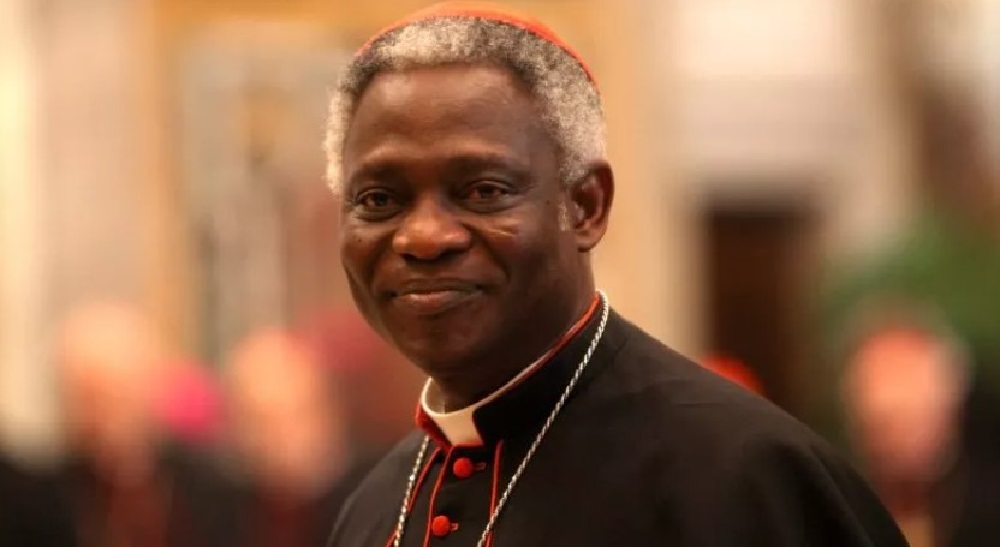
The Metropolitan Archbishop of Cape Coast, Most Rev Charles Gabriel Palmer-Buckle, has made a strong case for Cardinal Peter Appiah Turkson to become the next leader of the Catholic Church.
According to him, the Ghanaian Cardinal, who is currently the Chancellor of the Pontifical Academies of Sciences and Social Sciences at the Vatican, is of the right age and has the requisite experience to be elected Pope.
He said the Church in Ghana will pray for the Cardinal, adding that his becoming Pope would be a great achievement for the country, 3news.com reports.
“But definitely, our Cardinal is also one of the Cardinals. He is of the right age, he’s had enough experience, and if his brother Cardinals think he is the right person, then they will be ready to support him.
“We will support him with our prayers and definitely it will be a great pat on the shoulders of Ghana if that should happen,” he is quoted as saying.
Most Rev Palmer-Buckle, who is the former Archbishop of Accra, however, indicated that the Holy Spirit will guide the Cardinals in choosing the next Pope.
“Let’s leave it to the Holy Spirit to do its work. When Pope Benedict died, about 1.3 billion Catholics all over the world went into prayer, and therefore, I am sure we are all going to go into prayer.
“We are going to go into prayer and we will allow the Lord to indicate who should be the next Pope,” he added.
The Metropolitan Archbishop of Cape Coast, Archbishop Palmer-Buckle’s comments come following the death of Pope Francis on Monday, April 21, 2025.
About Pope Francis’ Death:
A number of global media outlets reported the death of the 88-year-old Pope early on Monday.
The Vatican Camerlengo, who is tasked with confirming the Pope’s death, has confirmed his passing.
“At 7:35 this morning, the Bishop of Rome, Francis, returned to the home of the Father. His entire life was dedicated to the service of the Lord and of his Church,” Farrell, the Vatican Camerlengo, is quoted as saying by apnews.com.
-

 News12 hours ago
News12 hours ago2027: Pro-Fubara protesters want suspended Gov to run as Atiku’s VP(Video)
-

 Economy19 hours ago
Economy19 hours agoMore Nigerians to experience poverty by 2027 – World Bank
-
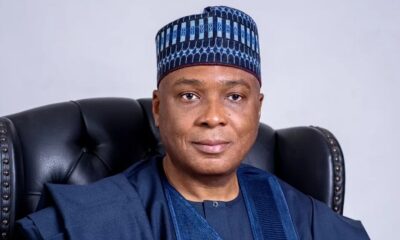
 News14 hours ago
News14 hours agoOborevwori /Okowa: PDP experiencing a rebirth and will soon bounce back-Saraki declares
-
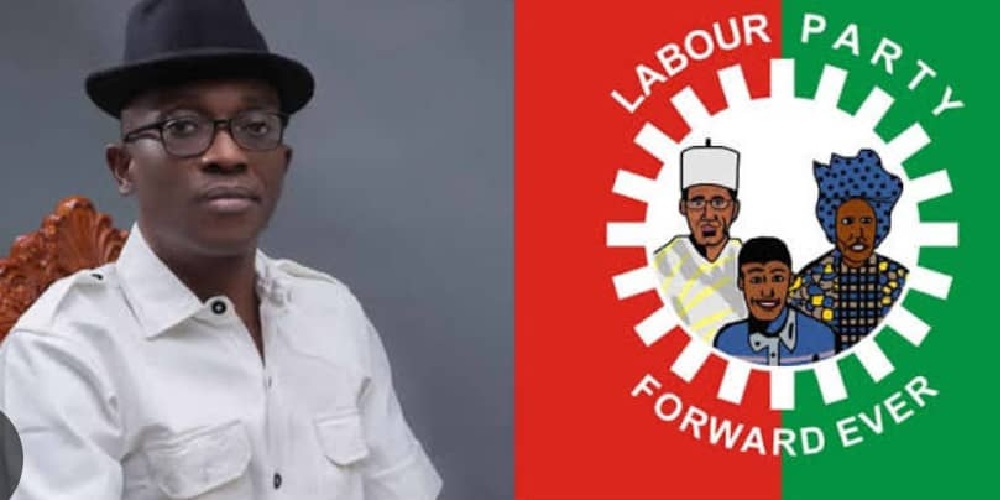
 Politics19 hours ago
Politics19 hours agoLabour Party reaffirms Abure-led leadership after Supreme Court judgment
-

 News20 hours ago
News20 hours agoGovernor Oborevwori’s Defection: A Masterstroke That Handcuffs Delta’s Opposition
-
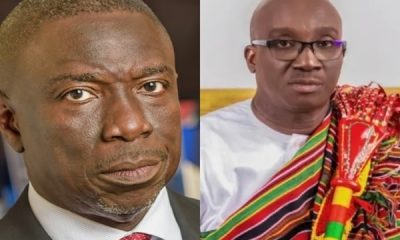
 News13 hours ago
News13 hours agoEdo poll: How APC allegedly offered witnesses N30m bribe
-

 News19 hours ago
News19 hours ago2027 done deal, more governors joining APC – Ganduje declares
-

 News12 hours ago
News12 hours agoFlights resume as NiMET unions suspend strike






